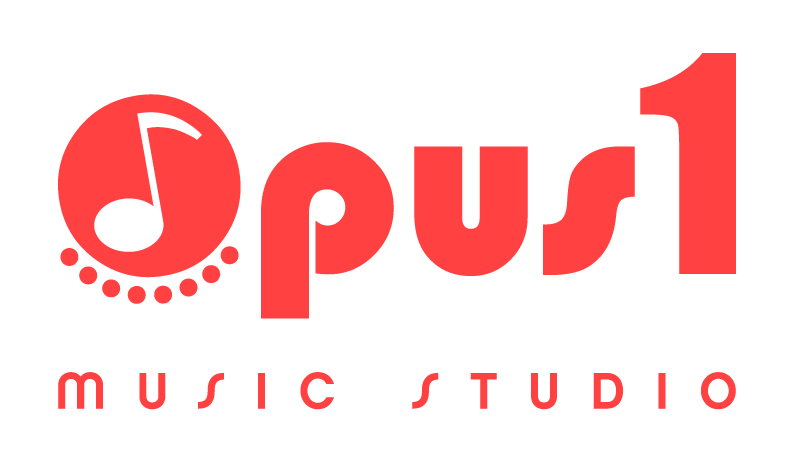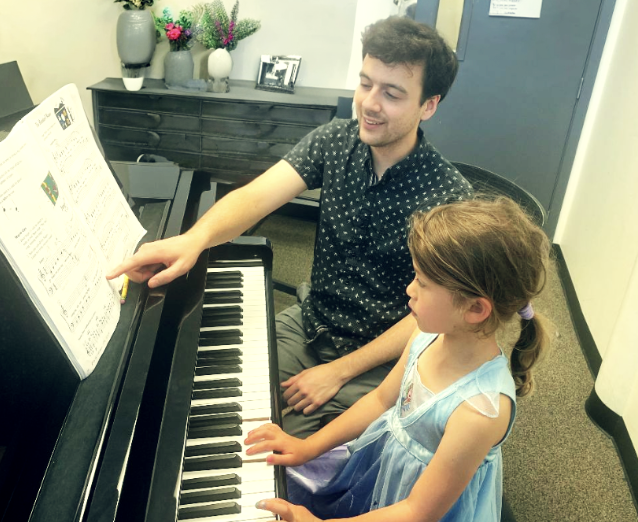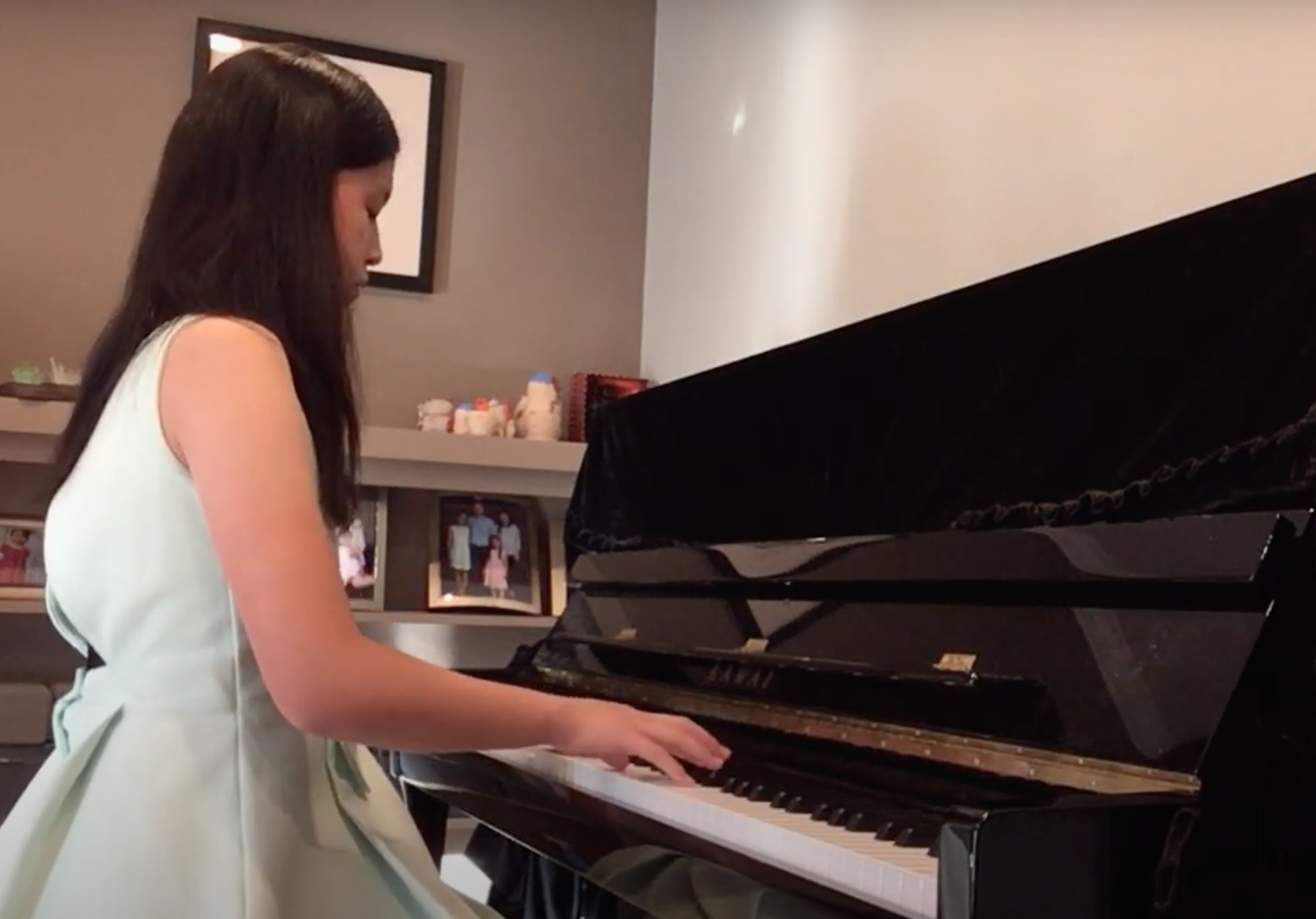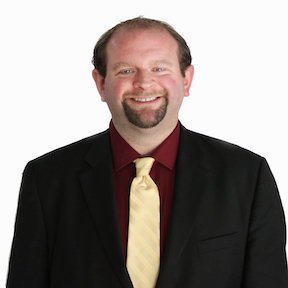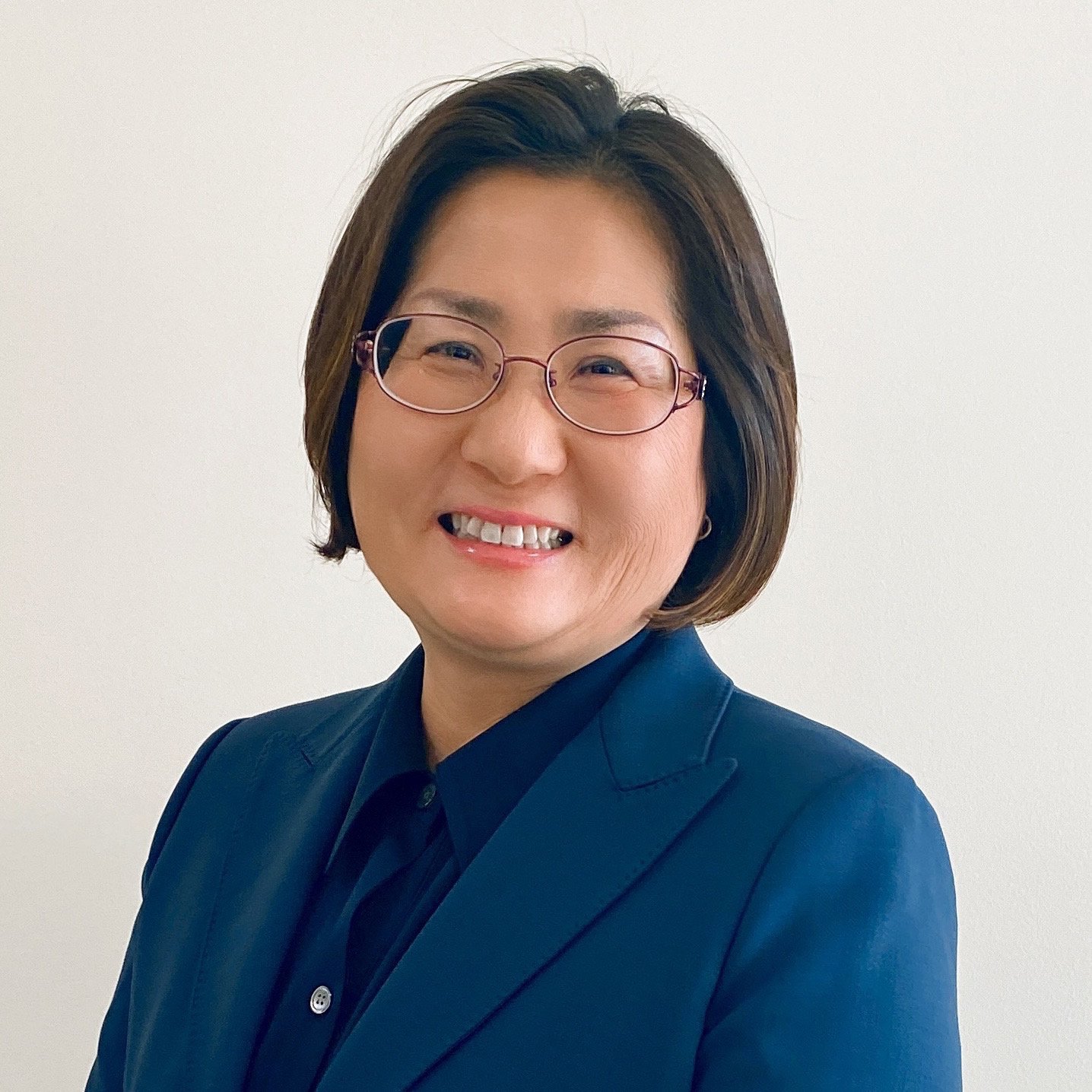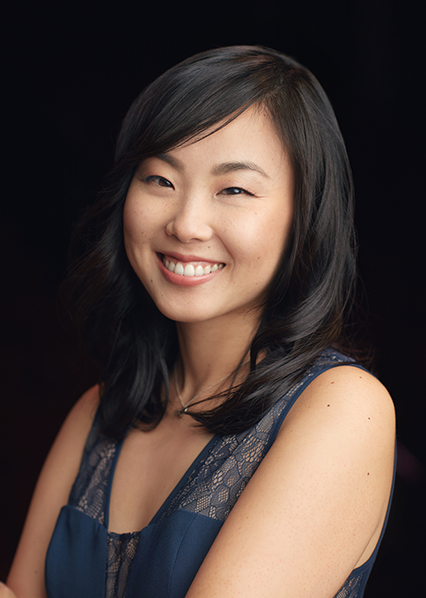Hi John, thanks for being part of our Opus 1 Faculty Spotlight. You’ve recently joined us this past month as one of our new guitar teachers. One of the interesting characteristics of learning guitar is not only the diversity of playing styles but also the ability to expand into other versions of a guitar (e.g. electric). Can you share what’s it like introducing these areas to beginning students within a path that lets them develop their own natural preference?
I generally try to keep both an acoustic and an electric in the studio as I teach. I also occasionally bring in a 12-string guitar so they can be exposed to that as well. That way if the student is interested in what any of these instruments sound like, I can demo them on the spot.
I also like to expose students to various styles of music in which each of these types of guitars is showcased. I keep an MP3 player on hand that has roughly 3,500 songs on it. I can call up multiple examples of how each of these individual instruments can shine in a particular genre.
I also carefully monitor not only the progress of the student, but I try to stay attentive to the particular style and artists in which they show the most interest. It’s also important to notice the style of performance towards which the student seems to be drawn. For instance, some students may be perfectly happy just strumming chords and singing pop songs for families and friends. Other students may be interested in learning the ins and outs of lead guitar in any number of genres, including rock, pop, country, blues, jazz, etc. Other students may be drawn more to the classical idiom. To that end, it is important to either a) listen to songs titles that they mention they might be interested in or b) take the time to ask them where their interest lies.
Having extensive experience as both a performer and a recording artist, I can make recommendations not only about what style of instrument a student might be geared for, I can also give them a great deal of information on specific models and effects that might enhance the experience for them.
Returning to the nature of the guitar having so many different version, can you share a bit about what sets different guitars apart from each other and maybe touch on how Ukulele fits into this spectrum? What kind of music sounds better and worse on which?
Being a performer, a recording engineer and something of a music historian, I’ve had extensive experience exploring the vast array of sounds that are available to today’s music student. There are some “tried and true” guitars that I would characterize as being somewhat formulaic and germane to a particular style of music. For instance, the Fender Telecaster has historically been the weapon of choice for the twang that country lead guitar players have sought over the years. To me, the Fender Stratocaster is perhaps the most versatile guitar on the face of the planet. That being said, nevertheless, there are some things in the rock world that a Les Paul or SG manufactured by Gibson can do that the Fender line can’t, just because of the nature of the electronics and the prototypical sound profile for which they were engineered. Then again, those players attracted to metal and extreme hard rock seem to gravitate towards the newer trademark names in the guitar building industry that have all the “bells and whistles” that players such as Eddie Van Halen, Joe Satriani, and Steve Vai use to get the effects to which they aspire. Some of the more notable brands are Ibanez, Jackson, Dean, and Charvel. These guitars feature “hot rod” components like locking vibrato arms and scalloped fretboards.
But that is not to say that the acoustic guitar, even the Spanish/Classical models don’t have a place in the rock, blues, country, or metal world. I’ve heard many high profile forceful guitar players use these instruments to achieve superb quality in the variation of their respective dynamics. Primary examples of this mode are players such as Stevie Ray Vaughn and Eric Clapton who use the acoustic for amazing sounds in the blues genre. Swedish Guitar Wizard Yngwie Malmsteen can shred just as poignantly on a classical guitar as he can on his signature Strat.
While the ukulele has traditionally been the ideal instrument for delivering Hawaiian slack-key music, these days I’ve heard many pop bands starting to include it in their repertoire of sounds. A few that come to mind are Bruno Mars, The Plain White Tees, Train, and Jason Mraz. It lends a texture over which any number of exotic sounds can be laid down. The Disney movie Moana, with it’s definitive uke version of “Somewhere Over the Rainbow” did a great deal to bring back the popularity of the instrument.
Another factor to consider when approaching the electric guitar is that there are as many kinds, flavors, manufacturers of amplifiers as there are guitars. Add to that the fact that now there are literally thousands of digital special effects (stomp boxes and multiple effects consoles) that can be used to manipulate sound from a guitar beyond all recognition. Even the guitar synthesizer world is getting up to speed and can be used with as much expertise as any keyboard player can muster. The array of sounds in the music industry today is absolutely mind-boggling.
All this being said, the current trend in the recording industry seems to be headed towards a movement in which none of the traditional rules concerning tones are beyond being broken. Just about anything goes in the studio anymore, particularly with the advent of the DAW (Digital Audio Workstation), in which sounds can be altered and effected with any number of plug-ins and other electronic signal altering devices. While many artists still stubbornly adhere to the axiom that “Analog still sounds warmer than digital,” more and more artists, myself included, have gone to recording “in the box,” meaning using a computer and some sort of software recording program such as Pro Tools, Logic Pro, Ableton, Reaper, and the like. These programs are more cost-effective and they are eminently faster to work with. So in that respect, there really aren’t any hard and fast principles concerning what instrument sounds better on any particular kind of music.
Myself, I keep 10 or more guitars in my stable of instruments to cover any sort of sound aura that I’m seeking for any particular tune. I generally lay acoustic tracks using both a mic’d signal to the console as well as the electric audio out from my acoustic electric and I mix and EQ the sounds accordingly. Most of the time I use my Strat or Tele to lay the basic tracks as they have the “good old Fender” reliable sound. If I need to track slide guitar I generally use a Gibson Firebird a) for its signature dark tone and b) for its incredibly long neck which enables me to get quite high in the upper register. For specialty work, when I want to go dive bombing I have a Ibanez SR Series with locking trem that enables me to bring lots of strange effects to the table. For amplification live I use a Blackstar combo on one side of the stage and a Fender DeVille on the other. This gives me the best of what is considered the two “worlds” of amp sound. The Blackstar has the British profile, a la The Beatles and The Who while the Fender gives me the California sound made popular by everyone from the old surf bands to blues masters like Stevie Ray and Buddy Guy. Although I use fairly minimal effects on stage, the dual amp stereo system allows me to “ping pong” a delay between the two amps across the stage, similar to what The Edge does in U2 and the sound is huge!!!
Many guitar students or people familiar with guitar often point out the use of a “pick” versus growing your nails out to serve the same function. What’s the difference and why when is one better than the other?
This is a question I get quite often and the answer to the second part of the question is “One is not better than the other.” While I have used a variety of picks with various thicknesses over the years, I have settled on Fender mediums for the silkiest sound I can get. However, one of the most famous guitar players in the world and a childhood hero of mine, Jeff Beck, simply uses his thumb. Someone asked him years ago why he doesn’t use a pick and his reply was, “I use to, but I kept dropping them.” However he went on to say that he felt using the flesh of his thumb over the years helped him to hone a signature “touch” and made his playing somewhat more sensitive and organic. If a student wants to play with their thumb, nails, or just the flesh of their fingers, I don’t see anything wrong with it if they can generate a tone that they are happy with. In truth, though I use a pick, I often employ additional strokes with a couple of the fingers on my picking hand. I’m also a pretty big fan of traditional American Travis fingerstyle picking. I know many classical guitarists that are absolutely fastidious about their nails, and it has shown proven results. I say do whatever works for you.
In additional to extensive experience teaching, you’ve also performed and recorded countless concerts. How does your own professional guitar performing help you as a teacher and what suggestions do you have for students on learning to perform themselves?
My most important suggestion runs fairly counter to the way I developed my own career. For years I played in cover bands (copying popular music) and felt it imperative to try to get as close to the original as I possibly could. In a way that aided what my style is today, as I covered a very diverse catalog of music and tried to take a little from every player I listened to. But at this juncture in my career, my advice to any student is to simply be yourself. Develop your own voice (whether that be literally--singing, or your voice on the instrument). It’s ok to try to come as close as you can to the music by which you are learning a technique, but the progressive student will take each of those techniques and create something of his or her own that is unique to them.
One related piece of advice I have is that if you can sing, by all means, do so. I tell all my students that the first job I got as a professional musician had nothing to do with the quality of my guitar playing. At the age of 17 I was a passable, somewhat mediocre rhythm guitar player who was scared to death to play any lead. But the band that hired me was far more interested in my ability to sing and harmonize than my strength (or weakness) as a guitarist. If one is looking to begin a career in music, someone who can sing and/or knows a little bit about music theory and harmonization always has an advantage over someone who is simply a guitar player, unless they are some kind of guitar virtuoso.
The last thing I would say about performance is that in addition to ability, much of performing is simply a matter of attitude. Stay practiced up so that you are confident. But it’s important to not be overconfident. Some of my worst performances were when I went to the gig thinking “I got this.” By the same token it’s ok to be a little bit nervous. Music should make us excited, after all, it’s emotional. I’m not encouraging stage fright, but a little bit of adrenalin facing an audience that you are unfamiliar with can go a long way towards keeping you focused and sharp. Last of all, value your audience. Chances are they paid money or at least gave of their time to come and see you. Let them know that this is important to you by treating them with respect and giving the best performance that you possibly can. I don’t mean that your gig has to be perfect in execution. I just mean that if you make the music come alive and speak to the people on an emotional and maybe even an intellectual level, they will realize your talent and your gig will be a success for both you and them. To me, that’s a win/win.
Break a leg!!!
